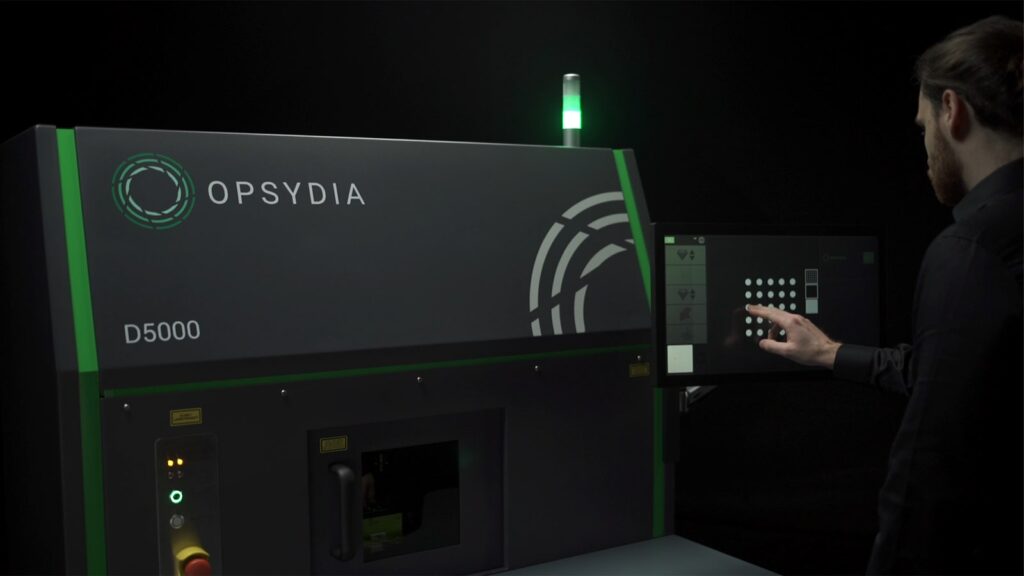Opsydia’s Revolution: Pioneering Invisible Nano-IDs in Diamonds Using Laser Technology
Opsydia’s Revolution: Pioneering Invisible Nano-IDs in Diamonds Using Laser Technology. In an impressive stride towards revolutionizing the diamond industry, UK startup Opsydia is using lasers to etch invisible identifier codes—dubbed as “nano-IDs”—inside diamonds. These minute inscriptions, placed beneath the diamond’s surface and linked to official certification documents or blockchain ledgers, require advanced equipment to be seen, ensuring they are almost impossible to tamper with or remove. This pioneering approach doesn’t just work to prevent diamond scams, it also aids traceability, authentication, and the assurance of ethical sourcing in the luxury and jewelry sectors. It doesn’t stop there either—Opsydia envisions this technology finding potential applications in the burgeoning field of diamond-based electronic devices, including quantum computing.

Opsydia: The UK Start-Up Behind Nano-IDs in Diamonds
Background of Opsydia
Imagine a world where each diamond has an invisible identity etched in it, bringing traceability and transparency to the vast diamond industry. This innovative idea has been brought to life by Opsydia, a UK-based start-up. They have pioneered the use of lasers to inscribe invisible identifier codes, known as ‘nano-IDs’, inside diamonds, thereby revolutionizing diamond authentication and tracking.
The engineering team behind the technology
The technology of Opsydia has been developed by a brilliant and groundbreaking engineering team. Their vast experience and deep insight into laser technology and diamond mining industry have helped them devise an impeccable system for inscription of nano-IDs in diamonds.
Financial and logistical operations of the startup
Opsydia’s financial and logistical operations are robust and focused on market expansion. Their laser technology machine comes at a price of £400,000 ($524,000), and the goal is not just about making profits but helping prevent scams by keeping the inscription safe and invulnerable.
Invisible Nano-IDs: A Revolutionary Insight
Definition and explanation of ‘Nano-ID’
A ‘nano-ID’ is an invisible identifier code that is inserted into the diamond using laser technology. It consists of numerous tiny dots imprinted just beneath the diamond’s surface. These nano-IDs are linked to official certification documents or blockchain ledgers, transforming diamond traceability.
Design and structure of nano-IDs in diamonds
The structure of the nano-ID is intricate and almost impossible to spot, requiring at least a 200X magnification and purpose-built illumination to view it. The nano-ID is not on the surface of the diamond, but rather embedded in it, ensuring its permanence.
Distinguishing features of nano-IDs
The main distinguishing feature of nano-IDs is their invisibility. They’re almost impossible to see without high magnification and specialized lighting. Also, unlike traditional laser inscriptions placed on the diamond’s surface, Opsydia’s subsurface inscriptions cannot be polished off or obscured.
Implementation of Laser Technology by Opsydia
Role of lasers in creating nano-IDs
The laser plays a key role in creating these nano-IDs. Opsydia’s laser beam is incredibly precise, which ensures no heat damage and that the inscription is almost invisible. This laser precision keeps the diamond’s aesthetic intact while embedding a vital security element.
Distinctiveness of Opsydia’s laser technology
Opsydia’s laser technology is unique in its precision and undamaging effect on the diamond. Its power to etch nano-IDs beneath the diamond surface without affecting the diamond’s quality sets it apart from other technologies.
Cost of Opsydia’s laser technology and its market value
The cost of Opsydia’s laser technology machine is around £400,000 ($524,000), highlighting its advanced features and capabilities. The market value of this technology is immense, considering its potential to revolutionize the jewelry industry and beyond.
Nano-ID Inscription and Durability
Procedure of inscribing a nano-ID into a diamond
The procedure of inscribing a nano-ID into a diamond involves the use of Opsydia’s high-precision laser technology. The stage to apply the technology is when the stone is being polished and cut, where the diamond can be marked with a code linked to its certification or blockchain record.
Why Opsydia’s sub-surface inscriptions cannot be removed
Unlike typical surface inscriptions, Opsydia’s nano-IDs are sub-surface inscriptions, which makes them permanent. They cannot be polished off or obscured, thereby ensuring an immutable trace of the diamond’s identity and history.
Quality assurance and durability of inscribed nano-IDs
The impeccable quality assurance and durability of nano-IDs stand testament to Opsydia’s commitment to innovation and integrity. Their nano-IDs, once inscribed, become a permanent and almost indestructible part of the diamond, offering a durable solution for authentication and traceability.

Implications for Traceability in the Jewelry Industry
Importance of diamond traceability
Diamond traceability is crucial in verifying the source of the diamond and confirming that it has been ethically sourced. Truly knowing the source of a diamond enhances consumer confidence and supports companies’ sustainability initiatives.
Nano-IDs’ impact on jewelry sourcing and production
The nano-IDs will tremendously impact jewelry sourcing and production. By establishing a clear and traceable line from source to market for each diamond, nano-IDs give brands the capability to guarantee consumers the ethical sourcing of their products.
Consumer impact due to transparency in sourcing
Consumers stand to gain significantly from the enhanced transparency that nano-IDs bring. With reliable confirmation of a diamond’s ethical sourcing and traceability, customers can make informed purchasing decisions, thereby steering the industry toward a more sustainable and responsible path.
Concurrency with Blockchain Platforms
How nano-IDs can assist blockchain track and authenticate diamonds
The nano-IDs can be linked to blockchain ledgers, aiding in traceability and authentication processes. Each diamond can have a unique identifier in the form of a nano-ID, which can be matched with its blockchain record, making it easy to authenticate and track.
Futurological painting involving blockchain and nano-IDs
Looking into the future, the combination of blockchain with nano-IDs holds tremendous potential. With blockchain for digital records and nano-IDs for physical identification, the diamond industry can have an unbroken chain of trust and transparency from the mine to the end consumer.
Opportunities for integrating Opsydia’s technology with blockchain ledgers
Integrating Opsydia’s technology with blockchain ledgers opens a world of opportunities. It can further reinforce the traceability and transparency endeavors of the diamond industry, making it easier to authenticate and track diamonds on a global scale.
Production Capabilities and Targets
Current processing capabilities of Opsydia
Opsydia’s current processing capabilities are impressive, with one machine able to process around 100,000 stones each year. The efficient processing, coupled with the high quality of inscriptions, indeed showcases the potential of this technology.
Future expansion plans and goals
Opsydia has hefty expansion plans and goals, aiming for a processing capacity of 10 million stones annually across their machines by 2025. These targets illustrate the company’s ambition to take this innovative technology to every corner of the gem and jewelry industry.
Influences on production rates and efficiency
As the company expands its operations, several factors can influence production rates and efficiency. Market demand, technological advancements, and industry collaborations are among key aspects that may shape Opsydia’s production trajectory.
Potential Applications of the Technology
Possible use of Opsydia’s technology on raw, uncut diamonds
Opsydia’s technology is currently applied when the diamond is being polished and cut. However, the company is contemplating if it is feasible to apply it to raw, uncut diamonds. This application has huge potential for early-stage validation and authentication of diamonds.
Other industries where the technology might prove useful
Beyond the jewelry industry, the technology might find utility in several other sectors. The field of electronic devices, including quantum computing, can harness this technology for identification and tracking purposes, rendering wide-ranging applications.
Role of the technology in the field of electronic devices, including quantum computing
In the burgeoning field of diamond-based electronic devices, including quantum computing, Opsydia’s technology might play a crucial role. The nano-IDs can help in the identification and tracking of these diamond-based devices, ensuring accountability and fostering growth in this sector.
Impact on the Luxury and Jewelry Sectors
How nano-IDs can enhance traceability in luxury items
Just like diamonds, other luxury items can benefit from nano-IDs for enhanced traceability. Watches, exquisite jewelry, and other valuable items can have an embedded nano-ID to ensure their authenticity, thereby building trust among customers.
Benefits to jewelry businesses
For jewelry businesses, Opsydia’s technology ropes in numerous benefits. In addition to ensuring diamond authenticity, it also promotes transparency, enhances customer trust and facilitates in ethical sourcing of diamonds. As a result, businesses can witness enhanced reputation and potentially improved profits. https://mauragemsandjewellery.org/resolution-reaches-the-blue-diamond-affair-ends-as-saudis-and-thailand-conclude-gemstone-dispute/
Evolving market trends due to nano-ID technology
The advent of nano-ID technology will lead to evolving market trends. Consumer demands for ethical and traceable products are increasing, and with nano-IDs, jewelry businesses can meet these demands effectively, promoting sustainability and responsibility in the industry.
Challenges and Future Prospects
Potential obstacles for Opsydia and their solutions
There might be innumerable obstacles for Opsydia as the technology is still relatively new. Challenges might lie in gaining widespread acceptance from the industry, cost issues, or unforeseen problems with the application of the technology. However, with resilience, innovation, and strategic planning, these challenges can be overcome.
Future research and development areas for the company
In future, Opsydia intends to delve deeper into improving the technology, diversifying its applications, and making it more affordable for broader segments of the industry. It is constantly looking at pushing the boundaries of what is possible and bringing innovation to other sectors as well. https://www.aigsthailand.com/
Long-term implications of the technology for global jewelry industry
The technology carries long-term implications for the global jewelry industry. It can potentially standardize authentication and traceability standards across the world, thereby building a more transparent, ethical, and responsible diamond industry.


